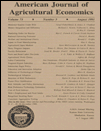Labor Contracting and a Theory of Contract Choice in California Agriculture
Abstract
We present a model of labor contracts, where seasonality, the sensitivity of output to labor quality and work intensity, and the relative advantages of labor contractors in recruitment and growers in supervision of seasonal farm workers determine the choice of employment contract. Differences in the optimal means of extracting work result in lower wages paid under labor contracting than direct hiring. We derive and estimate the probability of labor contracting and wages as functions of worker and job characteristics using data on California farm workers and employers. From estimated expected wages, our results indicate that successful unionization or reducing the flow of undocumented workers into California agriculture both would reduce contracting and increase wages.




